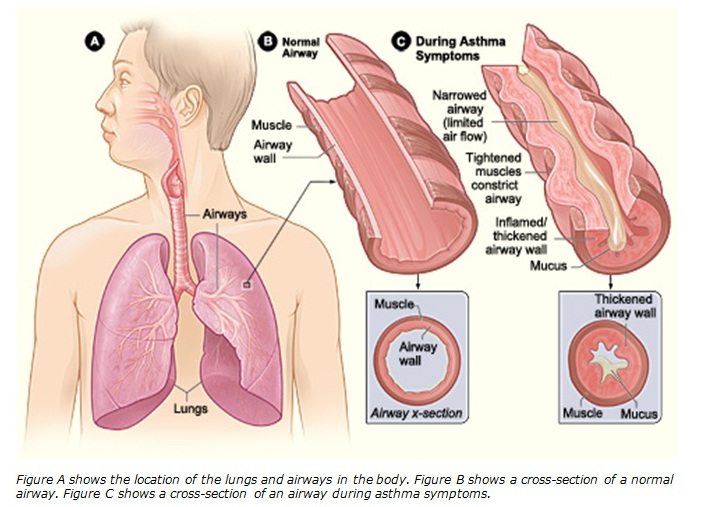
Asthma
What is asthma? — Asthma is a condition that can make it hard to breathe. Asthma does not always cause symptoms. But when a person with asthma has an “attack” or a flare up, it can be very scary. Asthma attacks happen when the airways in the lungs become narrow and inflamed). Asthma can run in families.
What are the symptoms of asthma? — Asthma symptoms can include:
- Wheezing, or noisy breathing
- Coughing, often at night or early in the morning, or when you exercise
- A tight feeling in the chest
- Trouble breathing
In most cases, we don’t know what causes asthma, and we don’t know how to cure it. We know that if someone in your family has asthma you are more likely to have it.

Is there a test for asthma? — Yes. Your doctor might have your child do a breathing test to see how his or her lungs are working. Most children 6 years old and older can do this test. This test is useful, but it is often normal in children with asthma if they have no symptoms at the time of the test.
Your doctor will also do an exam and ask questions such as:
- What symptoms does your child have?
- How often does he or she have the symptoms?
- Do the symptoms wake him or her up at night?
- Do the symptoms keep your child from playing or going to school?
- Do certain things make symptoms worse, like having a cold or exercising?
- Do certain things make symptoms better, like medicine or resting?
How is asthma treated? — Asthma is treated with different types of medicines. The medicines can be inhalers, liquids, or pills. Your doctor will prescribe medicine based on your child’s age and his or her symptoms. Asthma medicines work in 1 of 2 ways:
- Quick-relief medicines stop symptoms quickly. These medicines should only be used once in a while. If your child regularly needs these medicines more than twice a week, tell his or her doctor. You should also call your child’s doctor if this medicine is used for an asthma attack and symptoms come back quickly, or do not get better. Some children get hyperactive, and have trouble staying still, after taking these medicines.
- Long-term controller medicines control asthma and prevent future symptoms. If your child has frequent symptoms or several severe episodes in a year, he or she might need to take these each day.
Almost all children with asthma use an inhaler with a device called a “spacer.” Some children also need a machine called a “nebulizer” to breathe in their medicine. A doctor or nurse will show you the right way to use these.
It is very important that you give your child all the medicines the doctor prescribes. You might worry about giving a child a lot of medicine. But leaving your child’s asthma untreated has much bigger risks than any risks the medicines might have. Asthma that is not treated with the right medicines can:
- Prevent children from doing normal activities, such as playing sports
- Make children miss school
- Damage the lungs
What is an asthma action plan? — An asthma action plan is a list of instructions that tell you:
- What medicines your child should use at home each day
- What warning symptoms to watch for (which suggest that asthma is getting worse)
- What other medicines to give your child if the symptoms get worse
- When to get help or call for an ambulance (in UAE, dial 998)
You, your child, and your doctor will work together to make an asthma action plan for your child. As part of the action plan, your child might need to use a device called a “peak flow meter.” This device is used at home to see how well your child’s lungs are working. Your doctor or nurse will show you and your child the right way to use a peak flow meter.
Should my child see a doctor or nurse? — See a doctor or nurse if your child has an asthma attack and the symptoms do not improve or get worse after using a quick-relief medicine. If the symptoms are severe, call for an ambulance (in UAE, dial 998).
Can asthma symptoms be prevented? — Yes. You can help prevent your child’s asthma symptoms by giving your child the daily medicines the doctor prescribes. You can also keep your child away from things that cause or make the symptoms worse. Doctors call these “triggers.” If you know what your child’s triggers are, you can try to avoid them. If you don’t know what they are, your doctor can help figure it out.
Some common triggers include:
- Getting sick with a cold or the flu (that’s why it’s important to get a flu shot each year)
- Allergens (such as dust mites; molds; furry animals, including cats and dogs; and pollens from trees, grasses, and weeds). Your Doctor may prescribe an Allergy test to help preventing Allergies.
- Cigarette smoke
- Exercise
- Changes in weather, cold air, hot and humid air
If you can’t avoid certain triggers, talk with your doctor about what you can do. For example, exercise can be good for children with asthma. But your child might need to take an extra dose of his or her quick-relief inhaler before exercising.
What will my child’s life be like? — Most children with asthma are able to live normal lives. You can help manage your child’s asthma by:
- Making changes in your life to avoid your child’s triggers
- Keeping track of your child’s asthma
- Following the action plan
- Telling your doctor when your child’s symptoms change
Sometimes, asthma gets better as children get older. They might not have asthma symptoms when they become adults. But other children can still have asthma when they grow up. If your child shows signs of respiratory distress or asthma symptoms, consider visiting urgent care services in downers grove.
Remember – you can control your asthma. With your healthcare provider’s help, make your own asthma action plan. Decide who should have a copy of your plan and where he or she should keep it. Take your long-term control medicine even when you don’t have symptoms.

